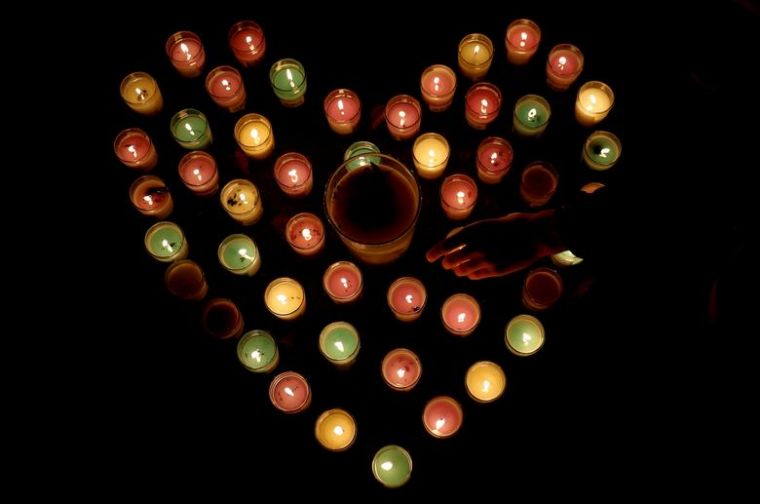NINE BEATS: How the beatitudes of Jesus speak to a broken world
We're three months in and already 2019 has been a hell of a year – literally, if you live in Aleppo or in South Sudan, Yemen or Venezuela. Or in any one of the countless communities worldwide buried below the poverty line.
Elsewhere, our political institutions have not delivered a better world but only hate, fear and greater division. Post-truth there is nothing we trust. Wars, shootings and bombings are carried out against and in the name of every religion and ideology. Refugees – many of them children – have crossed continents and risked death at sea to sleep on the streets of Western European cities. Climate chaos and school shootings have brought our young people out on the streets, demanding that things should be different. For those willing to listen, those who are awake: the world is not as it should be. We are hurting. The system isn't working. The empire is bust.

But now is not a time for despair.
If you feel something is broken, then listen for the strains of an ancient teaching that have been there all along. Listen for the whisper of another world.
Two thousand years ago, Jesus stood on a Palestinian hillside and declared that the poor, the grieving, the meek, and the persecuted are blessed. The outsiders, the oppressed, and the forgotten are included.
In the beatitudes Jesus invites us to trust, not fear; lament, not denial; cooperation, not comparison; agency, not despair; compassion, not judgement; honesty, not pretence; human embrace, not division; surrender, not retaliation.
A growing tribe of us are exploring these nine sayings – nine beats – as a path of recovery, back to reality. They are an invitation to walk through life differently, a rhythm we are desperate to feel reverberating through our world, up through the soles of our feet, right to our bones.
In a world where Christianity has become toxic to many – with the Bible too often wielded as a weapon against difference – the beatitudes call us back to the radical way of Jesus. The counter-cultural manifesto of the nine 'beats' is as relevant now as it's ever been.
Early in 2016 what became the NINE BEATS Collective first gathered to explore the beatitudes together at a retreat centre in the hills above Los Angeles. Many of us hadn't met before – connected together loosely through friends of friends and word of mouth. We were a strange collection of artists, musicians, theologians, and activists, drawn together from three continents. The beauty of NINE BEATS began in diversity – of culture, music, perspectives, background, race – a gloriously wide canvas to create from.
It shouldn't have worked – but with these beguiling, subversive, inclusive words spoken by Jesus 2,000 years ago as the common thread, somehow it did. And if it worked here, why not everywhere?
What began as a creative hothouse soon became an album of music inspired by the wisdom of the beatitudes. A big concept album, musical styles ranged from classical to African vibes, and pop to 'dirty gospel'.
As Collective member Vince Anderson described it: 'You have a collection of songwriters, artists, musicians, that aren't trying to set the beatitudes to music – but rather try to find the essence of what they are and write around that. It's almost like we're writing in between the cracks of the beatitudes. There's a space in between each beatitude that this album is trying to fill.'
Gigs and gatherings followed, and we began to find ourselves truly captivated – if not a little obsessed – by the beatitudes. These strange upside-down blessings connect with the real struggles of our lives and our world. And we find their echo everywhere, as communities practise peace and justice and forgiveness in ways both profound and everyday.
You'll recognise them too. We've filmed stories around the world from people walking to this beat. There's a priest in California who arrived as a child from the hills of El Salvador and daily builds community with street-sleepers and undocumented migrants. A journalist in the UK who took her years of practice as a foreign correspondent and began to tell stories of how people forgive, in the face of unimaginable pain. A former 'street child' in Uganda who uses his success as a music artist to advocate for children's rights.
And there's us – all of us who dare to hope for change. And who know that change has to begin with us. NINE BEATS is so much more than an album. We hope it's a movement. Will you join us?
Here come the oppressed, they own the future.
Here come the grieving, they will be comforted.
Here come the enslaved, they will have the whole earth.
Here come the ones who are starved of justice, they will be filled.
Here come the gracious, they will be shown grace.
Here come the uncorrupted, they will see God.
Here come the peacemakers, they will be protected.
Here you come you oppressed, you wrongly accused.
Take heart, they did this to heroes whose ghosts will not die.
(The beatitudes – an invocation, by Matt Valler/NINE BEATS Collective.)
Danielle Welch is a founding member of the NINE BEATS Collective and co-author of 'The Ninefold Path – experiments in the beatitudes'. Find out more at www.9beats.org. Danielle lives in South London and is a community leader at Oasis Waterloo.











